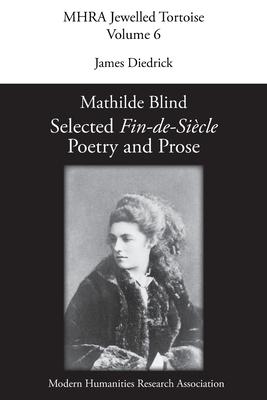Mathilde Blind's contributions to the New Woman and Decadent movements in the 1880s and 1890s placed her at the centre of fin-de-sicle literary culture. She rose to prominence in the early 1870s, both as an expert on and proponent of the poetry of Percy Bysshe Shelley and as one of the few women writers published in the Dark Blue (1871-73), an influential journal that featured the work of Britain's leading Pre-Raphaelites and aesthetes. By the late 1880s, she had established close associations with key figures of England's emergent Decadent communities, from Vernon Lee and Rosamund Marriott Watson to Oscar Wilde and Arthur Symons. When her Dramas in Miniature appeared in 1891, she was fusing aestheticism and Decadence so distinctively in her poetry that Symons evoked Charles Baudelaire in calling the dramatic monologues in the volume 'flowers of evil'. Her career thus highlights the connections between mid-Victorian aestheticism and late-century Decadence. It also serves as an important corrective to the male-focused narratives that long dominated accounts of these movements. In addition, and because Blind was born in Germany of Jewish parents and part of a community of exiled European radicals, her poetry and prose alike are characterized by a transnational, cosmopolitan outlook that ranges across national borders and consistently engages with Continental writers and ideas.
This new edition for the first time brings together the three major volumes of poetry Blind published between 1889 and 1895 alongside a critical introduction and explanatory notes. Because she was also an active reviewer and essayist throughout her career, it includes a selection of her reviews as well as her essay 'Shelley's View of Nature Contrasted with Darwin's', which serves as an important supplement to her 1889 volume The Ascent of Man. The edition also features a selection of critical responses to Blind's writing by leading late-Victorian poets and critics.
